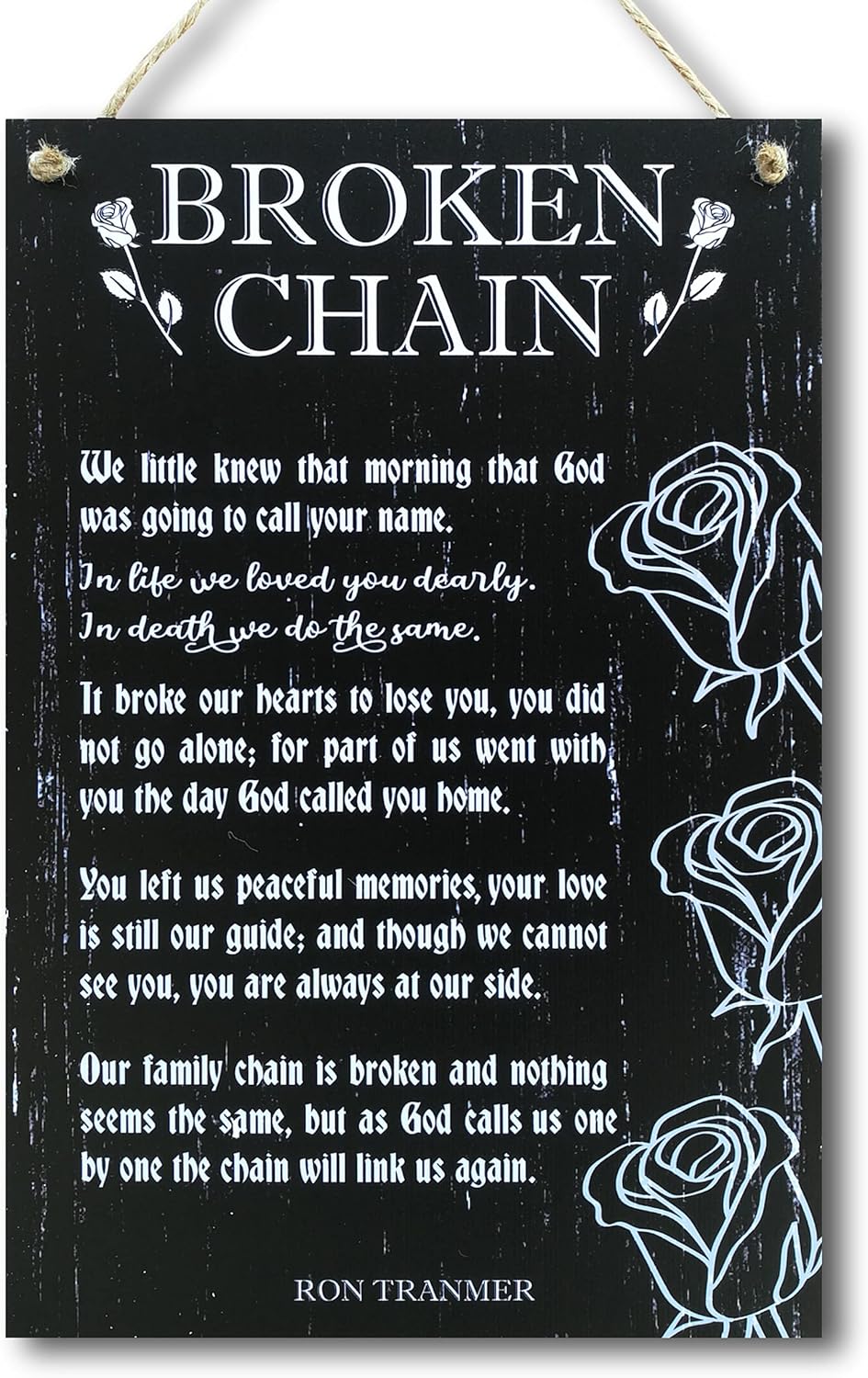
CARISPIBET Broken Chain | Poem memorial bereavement sympathy condolence funeral gift for loss of loved one 12" x 8"
FREE Shipping
CARISPIBET Broken Chain | Poem memorial bereavement sympathy condolence funeral gift for loss of loved one 12" x 8"
- Brand: Unbranded

Description
Alliteration: occurs when the poet repeats the same consonant sound at the beginning of multiple lines. For example, “dearly” and “death” in lines three and four of the first stanza. As the poem progresses, the speaker describes how everyone is devastated that this person has died, but they did not go to Heaven alone. Memories and love went with them, and one day they will all be reunited in Heaven at God’s side. What is very important in this context is that the author does believe the family will be made whole again eventually, in the afterlife. Use Of The Broken Chain Poem In Sympathy And Memorial Gifts The broken chain symbolizes a life that has broken. In the fourth stanza, the reader learns that the person who passed away was a family member. The author also tells us that he is not just stating his emotions and feelings; rather, he is sharing the feelings of all of the family members.
The poem speaks to anyone who has lost someone. Why? Because e ven though you learn to move on and live without your loved one, you are never the same. Also important in this poem, however, is that the author believes that these family members will be reunited. The author clearly believes in an afterlife where the family will be made whole again. What Is The Lesson In The Poem?The Broken Chain’by Ron Tranmer is a four-stanza poem that is divided into sets of four lines. These are known as quatrains. The poem follows a simple and direct rhyme scheme of ABCB and changing end sounds from stanza to stanza. Readers should also take note of the exact time in the second stanza with the word “you” ending both lines one and three. Repetition: occurs when the poet repeats one or more elements of a poem. This could be the structure, an image, a word, phrase, or more. In this case, the poet repeats the idea that “God” called “you” into Heaven and there was nothing anyone could do about it. It is apparent that the speaker and his family members did not know the person was going to pass away because God unexpectedly “called his name.” However, the author explains that even though the person is no longer with them on earth, the love of the deceased person has not changed.
Throughout this poem, the poet makes use of several literary devices. These include but are not limited to: In the first stanza of the poem, the speaker refers to someone who God called to their side. This is a phrase that is commonly used to suggest that a person has passed away and, according to Christian belief, gone to Heaven to live alongside God. It is an example of a euphemism that requires some context, and knowledge of allusion, to understand.
The poem begins with the speaker directing their words to a specific listener, someone who has passed away. The speaker and their family members did not know that this person was going to die that day or “that God was going to call your name.” But, the speaker explains how everyone on Earth loves this deceased person in the same way they did when they were alive. Author Ron Tranmer was born in Idaho in 1940. He is a self-proclaimed poet who reports writing his first poem at age 8 for a girl in his class. When the poem resulted in the recipient’s pleasure and smile, he kept writing. To date, he has published over 400 poems on traditional themes such as God, country, family, compassion, friendship, and humor. The poet does not use a specific metrical pattern throughout the four stanzas of this poem. But, there are some examples, in combination with the rhyme scheme, that suggests the poet is interested in the ballad or hymn form. This is seen through their near use of alternating lines of iambic trimeter and iambic tetrameter in some stanzas.
- Fruugo ID: 258392218-563234582
- EAN: 764486781913
-
Sold by: Fruugo
